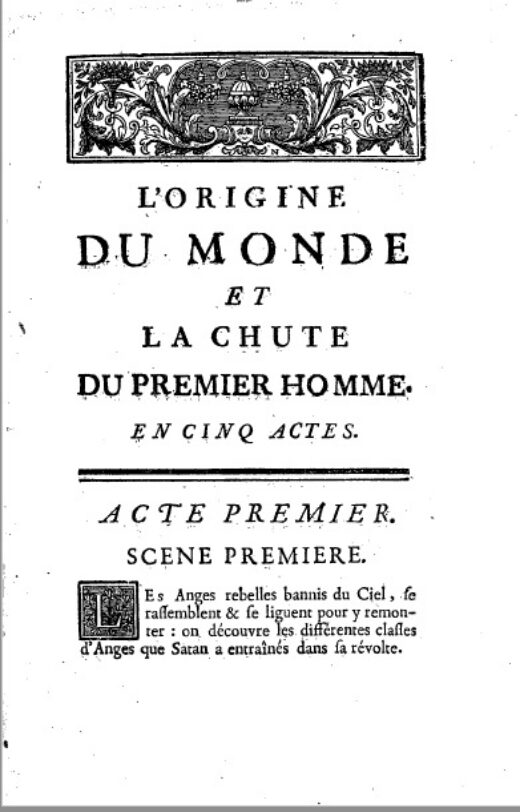
Printed summary
9 pages
Author(s)
L'Origine du monde et la chute du premier homme
In the entry “Marionnettes” (Puppets) of his Dictionnaire universel des littératures (1876), Gustave Vapereau mentions this short book published by Josse. This publication bears witness to the legacy of the “last dramatic Mysteries” performed “by wooden or wax actors” until the middle of the 18th century. It is true that mechanical tableaux and shows of automated figures (often travelling, and more or less rigged) still performed episodes from the Old or the New Testament; however, the inspiration is different here: this is evident in the explicit reference to John Milton’s poem Paradise Lost (1667). Josse’s “performance with paintings, machinery and music” seems to follow on from the success of this poem’s translations in French – particularly Nicolas-François Dupré de Saint-Maur’s (1729), which was republished several times.
In 1758, the painter and set designer Giovanni Niccolò Servandoni (1695-1766) performed Chute des anges rebelles (Fall of the rebel angels), a play also inspired by Milton, in the Théâtre de la Salle des machines in the Tuileries Palace. This show may have inspired Josse’s humble performance put on in his family’s hand fans workshop.
God creates the world and defeats evil
Satan and the Anges rebelles (Rebel Angels) are trying to go back to heaven, but they are defeated and repelled into the abyss by the Archange Michel (Archangel Michael). The Verbe (Word; God) appears and creates the planets. In the underworld, the Anges rebelles are planning their revenge: they gather riches and have a palace built. Satan finds out that Dieu (God) is going to create l’Homme (Man) and he wants to cause his downfall. He manages to escape Hell and to go to the physical World. In the Terrestrial Paradise, Ève, tempted by Satan posing as a snake, convinces Adam to eat the Fruit from the Tree of knowledge. The two are driven out of Paradise. Carried to a mountain by an Ange (Angel), Adam sees the future in a dream—episodes from the Old Testament, the birth and death of Jesus, the Last Judgment. The last tableau shows the Almighty God on his throne.
First performance
Rue Greneta, À l'éventail des quatre saisons.
Publications and translations
L'Origine du monde et la chute du premier homme, pièce en 5 actes tirée du Paradis perdu de Milton, spectacle de peinture, mécanique & musique qui en expriment les différentes actions, composé et joué par le Sieur Josse. Paris: Claude Hérissant, 1763